The UK’s much anticipated new security, defence and foreign policy paper, Global Britain in a Competitive Age, sets out the government’s overarching national security and international policy objectives. Reviews have been mixed.
Read more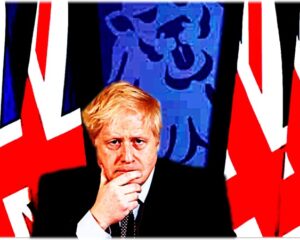

The UK’s much anticipated new security, defence and foreign policy paper, Global Britain in a Competitive Age, sets out the government’s overarching national security and international policy objectives. Reviews have been mixed.
Read more
US President Joe Biden will join with the leaders of Japan, India and Australia on Friday this week [12 March 2021] at a virtual gathering of the “Quadrilateral Security Dialogue”.
Read more
Australia places ASEAN “at the heart of our vision for the Indo-Pacific”. But a powerful dynamic, unrelated to the Indo-Pacific concept, is drawing ASEAN countries closer to China. In future, Southeast Asia may at best be neutral, or may possibly be more closely aligned with China. ASEAN could then be central to China’s “vision”.
Read more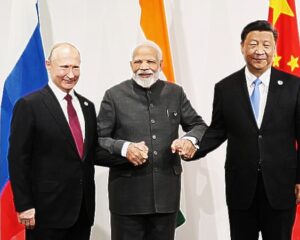
It is reported that Iranian forces have launched a two-day navy exercise with Russia in the northern part of the Indian Ocean, with India also joining in and China expected to take part. Exercises include shooting at sea and air targets and liberating hijacked ships, as well as search and rescue and anti-piracy operations.
Read more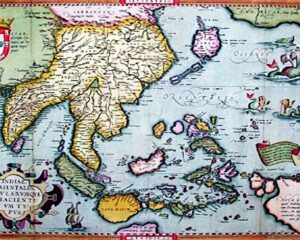
In the dying days of the most chaotically dysfunctional presidency in living memory, outgoing officials in Washington declassified the Trump administration’s Strategic Framework for the Indo-Pacific. At issue is not only the contents of this document, but the manner and timing of its release and further, what its reception in Australia says about Australia’s relationship with the United States, and whether it shapes expectations for the new Biden presidency.
Read more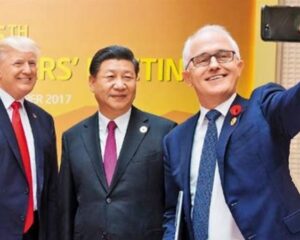
On 12 January 2021, the outgoing Trump administration released a declassified document titled em>United States Strategic Framework for the Indo-Pacific. The document was declassified some thirty years ahead of schedule to enable its early public release. This unusual step by an outgoing US administration has seen the emergence of a range of views on the merits of the document, and the intention behind its early release.
Read more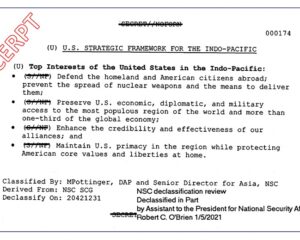
On 12 January 2021, the then US National Security Advisor, Robert O’Brien, released a declassified document titled the United States Strategic Framework for the Indo-Pacific. The document was declassified for release on 5 January 2021, thirty years before this was due, in the last days of the outgoing Trump Administration. What should an Australian analyst make of this document?
Read more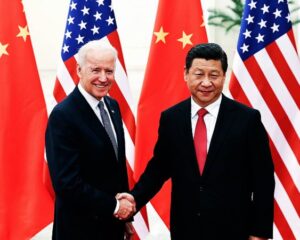
China already has significant geopolitical and economic clout in Asia and beyond – especially through the Belt and Road Initiative, its massive investment program in global infrastructure, and commercial development. Economic decoupling is not in the offing; China is far too integrated into the global economy. So is there a “China strategy” that would reunite the US and its democratic partners?
Read more
Richard Armitage and Joseph Nye, long time pillars of the Washington national security policy elite, are the lead authors of a new report from CSIS on the US-Japan alliance, with a suggested “new agenda for the challenges and opportunities on the horizon”. It is deeply refreshing to see them acknowledge, albeit somewhat wistfully, that there is no going back to US hegemony. To exercise influence the US will have to partner with other states.
Read more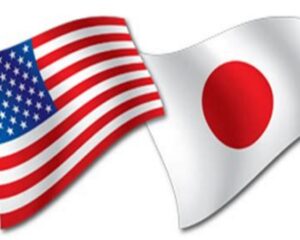
Richard Armitage and Joseph Nye have led a team to produce a new “bipartisan Armitage-Nye” report on the state of the US-Japan alliance, seen as critical to addressing both regional and global challenges. On the question of China and US strategy in Asia, the report is both entirely predictable and refreshingly surprising.
Read more
Chatham House’s Bill Hayton looks at the UK’s ’tilt’ to the Indo-Pacific – involving trade, military presence and diplomatic efforts, concluding that the overall effect is likely to embed the UK in the Indo-Pacific as a valuable partner for those countries which value a free and open international order.
Read more
The recent Belfer Center report by RAAF Group Captain Jason Begley, Winning Strategic Competition in the Indo-Pacific, offers important insights into the strategic thinking of the Australian military. The author’s analysis of the strategic competition with China in which the US and Australia have engaged far surpasses the level of the policy arguments offered in the Australian government’s 2020 Defence Strategic Update.
Read more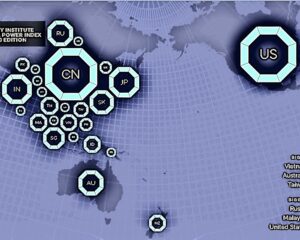
The Lowy Institute’s Asia Power Index 2020 is a substantial undertaking that purports to map “out the existing distribution of power as it stands today, and tracks shifts in the balance of power over time” by ranking “26 countries and territories in terms of their capacity to shape their external environment”. However, a misunderstanding of the concept of power, and some underlying subjectivity and biases, undermines its usefulness.
Read more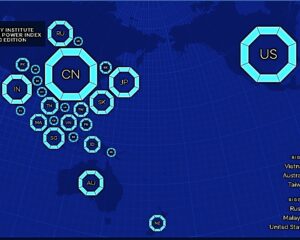
The annual Asia Power Index measures resources and influence to rank the relative power of states in Asia. The 2020 edition — which covers three years of data — is the most comprehensive assessment of the changing distribution of power in Asia so far. Among other things, it aims to sharpen the debate on the geopolitical consequences of the COVID-19 pandemic.
Read more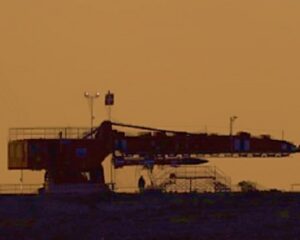
With Russia, China and the United States leading the development of operational hypersonic weapons, other Indo-Pacific states, including Australia, have indicated that they intend to do so in the intermediate future. This comprehensive Atlantic Council primer seeks to marry technological characteristics, geostrategic and military imperatives, and regional dynamics in order to provide a basis for further analysis about hypersonic development and application trajectories in the Indo-Pacific.
Read more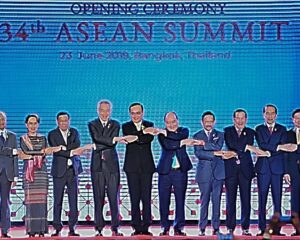
It seems clear from recent surveys that the Australian government is overestimating its influence in ‘the immediate region’ and underestimating the capacity of the ASEAN states, in particular, to recognise their own strategic interests. The strategic objectives set out in the 2020 Defence Strategic Update rest on the assumptions that Australia will be able to ‘shape’ strategic perceptions in the region, and that this can best be done while acting in close association with the US. Are the foundations of Australia’s strategic logic sound?
Read more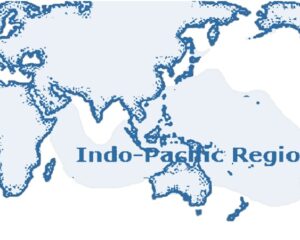
This article is one of a number of pieces circulating that usefully starts to ponder the effect COVID-19 will have on strategic relations in the Indo-Pacific. It presents one of the more comprehensive lists of possible effects. The narrow focus of the article, however, means two major results of the pandemic, a change in the relativities in economic power and a possible change in the US Administration, are not clearly factored into the analysis. With regard to the question of impact of Covid-19 on military readiness, there may be room for greater caution; it is yet to be seen if the worst predictions about a shift in the military balance because of readiness issues will eventuate.
Read more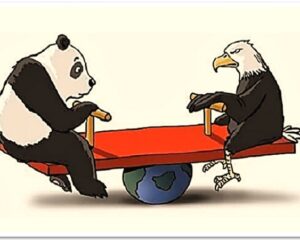
An insightful paper that seeks a strategy for Europe ‘to escape the bipolar logic that demands it choose between the American and Chinese economic/technological spheres’. The recommendations for Europe should resonate equally in Australia – a country already caught up in the global competition for influence, and likely to be subject to ‘increased pressure from Washington on its allies to take a clear position on the sharpening US-China conflict and clearly side with the United States’.
Read more